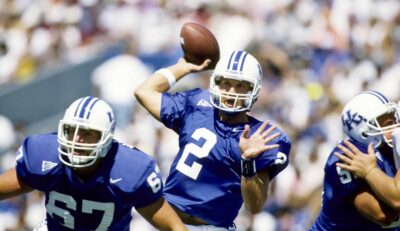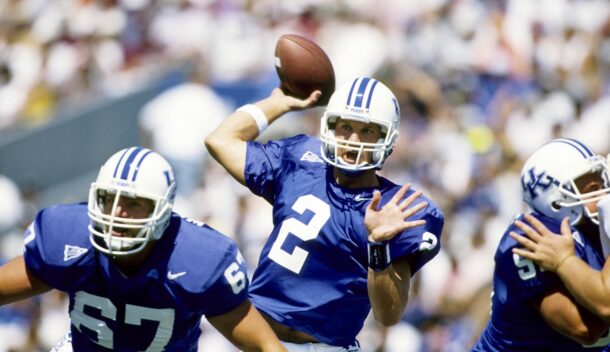
Ole Miss football: What can we expect from RichRod’s offense next year?
By Rick Stavig
Published:
Matt Luke followed up a home run defensive coordinator hire with his second round-tripper in as many at-bats when he hired Arizona/Michigan/West Virginia head coach Rich Rodriguez as the Rebels’ new play-caller.
It’s a sensational hire.
The question that immediately begs to be answered is: What can we expect Ole Miss’ offense to look like under RichRod’s guidance?
Remember, the Rebels have essentially been running an Air Raid offense the past few years, and Rodriguez is known for his spread zone-read offenses, with a heavy emphasis on the rushing attack. So, at first glance, it appears the Rebels will go from a pass-heavy team to a run-heavy team. That’s not necessarily the case.
Both schemes are in the same family, similarly built around the principle of spreading out the defense with the idea of putting playmaker in space to, you guessed it, make plays. Where it branches out, though, is that while the Phil Long scheme emphasized chunk passes downfield to stretch the defense vertically, Rodriguez’s spread scheme expands a defense horizontally and keeps them off balance with the number of potential ball carriers to account for.
Does Ole Miss have the personnel to run this?
It’s not an ideal marriage in terms of scheme and personnel, but Rodriguez is a good enough coach to adapt the scheme to the pieces in place. Similarly to Mike MacIntyre more than likely not thrusting a full time 3-4 defense on a roster built for a 4-2-5, Rodriguez can incorporate elements of his preferred scheme while still playing to the strengths of the pieces on hand.
Matt Corral is firmly entrenched as the starting quarterback, and while he’ll never be confused with guys like Pat White, Denard Robinson or Khalil Tate, he has more than enough athleticism to provide a threat to run the ball. I doubt Luke wants him carrying the ball 15+ times a game, but 5 to 10 carries is reasonable. His ability to pass the ball is also a luxury that Rodriguez didn’t have with White, Robinson or Tate, and that should unleash new dimensions to the typical scheme Rodriguez has favored over the years.
Frankly, I’m envisioning a similar offense to what he ran when he was coordinating Tulane’s offense in 1997 and 1998, when he turned Shaun King into a 2nd-round draft pick and Heisman contender.
In the two years prior to Rodriguez, King completed 47 percent of his passes for 2,620 yards (5.5 yards per attempt) with 10 touchdowns and 14 interceptions, while rushing for 6 yards on 89 carries (0.06 yards per carry). The two years with RichRod? King completed 61 percent of his passes for 6,075 yards (8.33 yards per attempt) with 62 touchdowns and 20 interceptions, while rushing for 1,152 yards on 280 carries (4.11 yards per carry).
King wasn’t an enormously gifted ball carrier, but he had enough athleticism to incorporate the RPO-elements that Rodriguez was looking for, and Rodriguez saw the natural arm talent King had and capitalized on his given strengths. I think he’ll see some similarities in Corral.
The offensive line is being completely rebuilt (that’s an article for another day), but there’s some intriguing skill position players for Rodriguez to work with, like running backs Scottie Phillips and Isaiah Woullard and receivers Elijah Moore, Braylon Sanders, Miles Battle and Dannis Jackson.
Give the Ole Miss staff credit, at least while they were neglecting defensive talent over the past few years, they certainly didn’t forget about skill players on offense, because there’s plenty of talent there, despite the losses from graduation and the NFL.
Ole Miss fans also will obviously want to know: Can RichRod recruit? Similarly to MacIntyre, he’s not the oil-slick, head-hunter who will reel in the white whales, but he’s proven with his ability to identify and develop talent, which is of far greater significance to winning on Saturdays than bold headlines on Signing Day.
Truthfully, this is another great hire by the embattled Luke. He has handled both coordinator searches with tremendous skill, not succumbing to the pressure to make a rash hire that potentially could have temporarily quieted fans, instead patiently waiting for the right guys who, quite frankly, have resumes that are far superior to the man they’ll now be reporting to.
More important for Luke, is that he’s now finally putting his own stamp on the program and guiding it in the direction he’s looking for after inheriting a horribly mismatched pair like Wesley McGriff and Phil Longo.
He’s also surrounding himself with experienced coaches who can help him through the trials and tribulations of learning how to build a program.
Rick Stavig, who played at Ole Miss and Shippensburg University, is the owner of SE Scouting. A veteran scout, he specializes in the NFL Draft and recruiting coverage.







